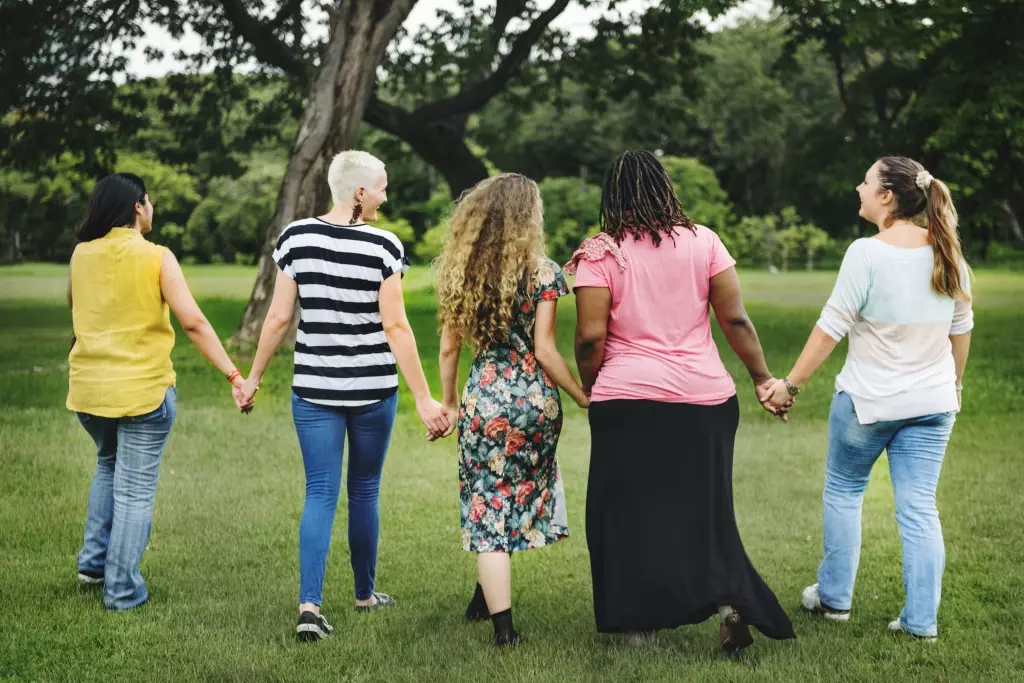Hi there. My name is Nikki. Nice to meet you.
I imagine, if you’ve not had weight loss surgery yourself, you have a family member or loved one who did. And I imagine that somehow, some way, they have gotten you to this page because you need to hear what I’m about to say. First and foremost, I want to say welcome to the site. After you read this post, I hope you’ll click around. My yummy recipes work for anyone wanting to live a healthier lifestyle!
But we’re not here to talk about recipes right now, are we? No, no. Right now we’re here to talk about how you can help your friend or loved one be as successful as possible in their weight loss journey. Because that’s ultimately what you want, right?
Now you may not agree with them having weight loss surgery, but I think we can both agree that it’s their body and their choice and that any opposition you put in front of them will make it harder for them to do what they need to do, which is lose weight and improve their health. Can we agree on that? Lovely!
In keeping with that goal (of being supportive of the journey to better health), we need to discuss what you say and how you say it. Because your loved one respects your opinion. Your words matter to them. And, whether you know it or not, your words can greatly affect their experience of getting healthier. Simply put: your words can help (thereby making the experience one where they feel supported, encouraged and excited for the improved life they will live) or they can hurt (making them feel shamed, judged, and, ultimately, making it harder for them to trust in you as a source of support). If your aim is to hurt the person in your life who has had, or is having, weight loss surgery, then you need to exit this post right now. However, if your aim is to help, please read on.
Here are a few things that – even though they may seem like a great idea at the time – you should never, ever, ever, ever, ever, ever, EVER say to a person who has had weight loss surgery. And I know folks don’t like being told not to say something. I know. I don’t either. But these things are things that can and will hurt, aren’t constructive, and don’t lead to the desired result which, again, is to help your loved one achieve a healthier lifestyle.
Ready? Here we go.
Don’t go gaining all that weight back!
This piece of advice usually comes either before surgery or in the months after and it is NOT HELPFUL. Why? Well for a few reasons:
- You are dooming us to failure before we’ve even had a chance to try. It’s like your mom pulling you aside on your wedding day and saying, “Now don’t you go getting a divorce!” Can we give it a chance first, maybe?
- In general, you should probably never say anything like this to someone who has had weight loss surgery because it makes them feel unsafe turning to you for support if they are, in fact struggling.
- It sort of reinforces the idea that people with obesity are such ONLY because of a lack of self-control. Now you may believe that, but I’m here to tell you that science has proven it untrue. There are dozens of reasons why a person can get obesity, and many reasons why it can be a hard condition to overcome.
Instead, try saying “I want to help you be successful in whatever way I can. Please don’t hesitate to call upon me if you need help!” That? Will make a person feel affirmed and supported.
Should you be eating that?
I am of the firm mind that before you ever say this to a person who has had weight loss surgery (or anyone really) you should do a self-inventory. The last thing you ate: should you have eaten that? If not, you should at least be able to recognize that sometimes people eat things that aren’t good for them and sometimes those things are hard to resist.
Now you might think you’re being helpful in pointing out what a person should/should not eat but really you’re doing the opposite. For starters, a healthy lifestyle is one that involves eating mindfully all the time and healthfully most of the time. Remember that old Jell-O catchphrase? (“Every diet needs a little wiggle room…”) That’s very true. A healthy relationship with food recognizes that occasionally there’s going to be a piece of cake or a cookie or some other treat. As we get further from surgery, we begin trying to learn how and when treats fit into our lives. This is good and healthy. And those five words above can send someone back into a rabbit hole of fear because they feel watched and judged.
Unless your loved one specifically asks you to police their food, don’t police their food. If you are truly worried about them regaining weight, the much more productive route is to get to know how they are doing as a whole person and let them tell you where they need help or support.
Weight loss surgery is the easy way out.
Now, on this one I will make a caveat. Weight loss surgery does make weight loss, for a time, inevitable, no matter what you do. But for a moment I’d like you to consider a scenario.
Imagine you woke up tomorrow with the stomach of a newborn baby, but the mind of your adult self. So you can’t eat much. New foods make you sick. But sometimes they don’t. But sometimes they do. And you don’t know when they will or won’t. And your body needs so many calories to survive but you’re incapable of eating that many calories, so you’re tired. But you also need to exercise to lose weight, even though you are tired. While you’re doing all this, you have to address the emotional attachments you had with food and the toxic relationships you had with people that made you turn to food in the first place. And while you’re doing all that, someone, somewhere is telling you that you took the “easy” way out.
That doesn’t sound very easy, does it? I didn’t think so.
Weight loss surgery is a treatment for obesity. There are many treatments for obesity. None of them are easy. They all require the person to make great changes to how they eat, move, and relate to people and the world. Don’t minimize your loved one’s experience by saying it was easier. It wasn’t. And the fact remains that the fight doesn’t end when they lose weight. You know that, or else you wouldn’t tell folks “don’t go gaining that weight back!” Obesity is a chronic, life-long health condition that your loved one will always have to manage. So while surgery is an effective tool to help take the weight off, your loved one never gets a “get out obesity free” card. That’s just not a thing that happens!
You’re getting too skinny! Stop losing weight!
This one is especially insidious because it tends to get under the skin of your loved one.
Look. I get it. This may be the first time – or the only time – you’ve ever seen your loved one at this weight. And, granted, the body can be weird about where it pulls weight. When I was losing my weight, my neck and cheeks went first and I looked like I was melting from the top up. Thankfully, after I lost weight I experienced what’s called “fat redistribution” which means that my body moved fat from place to place until I looked halfway normal again. But I imagine for a time I did look awkward.
And that’s probably what you’re reacting to. But it’s not helpful to tell a person who has had weight loss surgery to stop losing weight. They are under the care of doctors whose job is to monitor their weight loss. If that person’s doctor is not concerned about their weight loss, you should not be either. Yes, it seems worrisome because you see your loved one shrinking and they don’t seem to eat much and they may even seem obsessed with food and fitness. This is all pretty normal.
But you know what the danger is in telling someone to stop losing weight? They may actually listen. And if they do, they may begin to start doing unhealthy things to curb weight loss. Not specifically because you said they should stop losing weight, but because that feeling can easily amplify, in our minds, to “everyone thinks I look horrible! I never got this when I was bigger!” Yeah. That. It’s an ugly thought pattern and no good can come of it.
The better route is to ask someone how their process is going. How close are you toward your goal? That’s a great question and most weight loss surgery folks LOVE to talk about their goal. Usually in that conversation, if there is a problem with losing too much or too fast, that’s when they would tell you. And then you can be supportive. But blindly saying, “Don’t lose any more weight!” is not helpful.
Bottom Line: Do No Harm!
As I said before, you probably want your loved one to succeed. If their success bothers you, that’s something within you that you need to address. It’s not your loved ones job to assuage your own feelings about your weight, or reassure you that they’ll still love you when they get smaller or to “fix” any of the other insecurities you may be having. If you are having insecurities, by all means bring them up and talk about them. But don’t try to slow down or derail your loved ones process because of how you feel about their decision to get healthy.
You love them. I know you do. So support them. And enjoy the benefits of the longer, healthier life they get to live with YOU as a result of their efforts!
 Bariatric Foodie Play with your food
Bariatric Foodie Play with your food



Nikki, this is wonderful. I don’t always read blogs because I get bored. I’m bad, I write my own but I’m bad at reading others. Anyways it’s awesome. Thank you.
My name is Tammy, this is an great blog. I look forward to reading more. I wished your blog was around year’s ago, I needed this type of support 3 bariatric surgeries ago… The Lap-band slipped after loosing 75 lbs and Dr. Revised it & performed a Gastric -Sleeve- Surgery, regaining 30 lbs. It’s not like that’s alot of weight to most post-bariactric patients. However, because of a serious accident on 9-11- 2001, I now live with alot pain, 25 surgeries later… I do fairly well.
Along with the 30lbs of regain, comes lots of physical pain & the knowledge that I truely need extra support for the success I desire… especially with the 3rd bariactric surgery. I look forward to getting rid of the limping from pain, constant steroid injections… I want to actually meet my original goal, and I’m taking a stronger look at facing my fear of acheiving of success in the why & how to achieve long lasting weight loss. January 14th, I had my Bariactic Bypass Surgery… for more than weight loss. I’m trying to find the support that I should’ve had several year’s ago, as well as changing some habits that kept me from acheiving my ultimate goal.
Thanks for really… trying to address the ongoing needs, that post-op patients have in their long journey.
Tammy
Hi Tammy,
Glad you found us! Bariatric Foodie has been around about 10 years, but sometimes it takes us a while to get around to everyone. You’re here now, and that’s what counts!
Hello, Nikki Lynn!!…just stumbled onto your blog…& just in time, I’m due to meet with bariatric doc on Friday…I’m a bundle of nerves, I hope he approves me 4 surgery.
Nikki Joyce
Beautifully written! One thing that my husband and I (gastric bypasses one week apart) have been dealing with is the fact that my husband did not have an especially excessive amount of weight to lose (60 lbs), but comorbidities drove his surgery. High blood pressure, Barretts esophagus, and severe reflux – which are all drastically improved since surgery in December. I have additional medical reasons beyond weight loss, although my goal is 100 lbs. The struggle has been that neither of us “looked” like what our family and friends considered “morbidly obese” (although I was). We get tons of comments similar to above from some people. It’s made us really stop telling anyone and if we do, we try to clearly explain that weight loss is just a part of the benefits to having bariatric surgery! You are an inspiration ????
So on point. Wish I’d had this to share with my family when I first went through surgery. Actually, they need to hear it now too!
I have heard all of them! Do not harm was told to me before surgery. That comment caused me to stop telling people. I thought, I researched it all and saw all my docs and they all agreed with the surgery, so just keep the secret to myself. Then after, I told everyone. The other comments were on too but I was commited to my goal. thanks for sharing.
I choose not to tell everyone. My daughter was very negative. She tells me that I look old. I don’t discuss any of my success ‘ s. #1 – I don’t remember asking her or anyone else for their opinion. My husband didn’t want me to have the surgery done but I have lost all the weight I needed to so I’m truly happy with myself. I have been successful since my surgery on June, 2016.